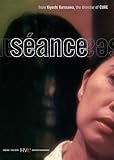
Average Reviews:

(More customer reviews)Ever since Hideo Nakata's Ringu achieved international acclaim, Japanese film companies have pushed hard to capitalize on that film's success. While much of this effort has, admittedly, produced other high-quality and interesting horror films, even the worthwhile efforts tend to follow set formulaic schemes. Many Japanese directors get so caught up in sleekly packaging mere repeats of previous scare scenes that they forget to experiment or even create a coherent world or story for the horror to occupy. Kiyoshi Kurosawa, however, constantly puts a new spin on the genre. From Cure to Charisma, Kairo to Doppleganger, horror's role in Kurosawa's films is always changing. The ways in which he experiments makes even his weaker efforts, as SEANCE regrettably shows itself to be, required viewing for film enthusiasts.
The film is most interesting in its first half, which is more marital drama than supernatural thriller. Junko Sato (Jun Fubuki) is a medium who, between the seances she performs, works with graduate student Hayakawa (Tsuyoshi Kusanagi) on a study chronically the potential for mediums to help the police in solving serious crimes. Junko's husband, Katsuhiko (Koji Yakusho), is a sound engineer on the way up, having recently finished his first major television project. Unfortunately for him, he leaves a large case unlocked as he records audio near Mount Fuji, and a young kidnapped girl, fleeing from her captor, picks it as a safe hiding place. Without noticing, he locks the case and takes it home with him; the poor girl remains locked inside until Junko, looking into the same kidnapping case at Hayakawa's behest, feels the girl's presence and discovers her unconscious body. She is not yet dead, though this is perhaps unlucky, and Junko leaps at this opportunity to prove, through a hoax, that her abilities are real and useful. The plan seems to work just fine, until the girl mysteriously turns up dead and her ghost begins to haunt the Satos.
What could have been quite an ordinary horror film, or, like the original, a fairly by-the-numbers thriller, under the control of many other directors is made truly interesting with Kiyoshi Kurosawa at the helm. Kurosawa's stated love for American films from the middle of the century is apparent throughout: the characters' lives beat at the slower pace pervading older American films, and the camerawork, pacing, and music suggest other elements of those films. And towards the end of the first hour, when things start to go downhill for our protagonists, Kurosawa creates a fantastically foreboding atmosphere. Things left off-screen are crucial parts of scenes, and somehow Kurosawa keeps their presence etched in our minds. When these elements start to disappear, replaced by an jarringly quicker pace, unconvincing special effects, and a drastic change in the film's focus, SEANCE begins to misfire. The plot is thrown to the wind (at a couple of occasions, it is as if in the world of the film fingerprinting does not exist), and any cohesiveness in characters, too, disappears. Despite all of these problems, Kurosawa keeps his audience glued to the screen and appeals so strongly to base instinct that these intellectual qualms, which seem so obvious in hindsight, must be almost searched for in context.
Only Jun Fubuki gives a performance as believable and multi-faceted as is to be found in most of Kurosawa's other work. This is no fault of the other actors, though, but seems to be inherent in the script. Koji Yakusho's character is, for most of the film, merely a plot device to help demonstrate and develop his wife's character. It is when the film's focus suddenly shifts to him that things begin to feel awkward, though this, also, is none of his fault. Yakusho has a brilliant way of making adrenaline and violence seem natural and almost warranted, and the rare scene where he physically beats the phantom haunting he and his wife could only be pulled of believably by Yakusho. The rest of the cast, including Ren Osugi and Sho Aikawa in brief cameos, all have simple, plot-advancing roles to play and do them well enough, it's just a pity that none of them were given any real opportunities to develop fleshed-out characters.
For the first hour or so, SEANCE is among Kurosawa's most engaging and interestingly approached films. That the second half is so disjointed (not in the deliberate, helpful way of some of Kurosawa's other films like Doppelganger) is therefore more disappointing than if the whole film had been simply mediocre. Still, for a film made within the confines of a made-for-television horror outing, SEANCE is an impressive show of Kurosawa's creativity and talent.
Click Here to see more reviews about: Seance (2000)
Based on Mark McShane’s novel, Séance on a Wet Afternoon (Kôrei), Kiyoshi Kurosawa’s international award-winning thriller stars Kôji Yakusho (Shall We Dance) as Kôji Sato, a sound effects engineer, and Jun Fubuki (Pulse) as his psychic wife. When a missing young girl escapes her kidnappers and hides in Kôji’s equipment case while he is recording sounds in the woods, the stage is set for a scheme to promote her psychic abilities. But the couple’s hoax goes terrifyingly awry in this unsettling and atmospheric shocker from one of Japan’s new masters of horror.

No comments:
Post a Comment